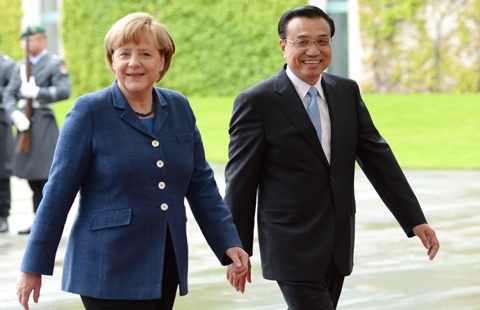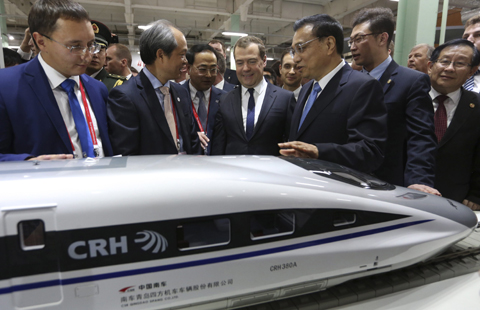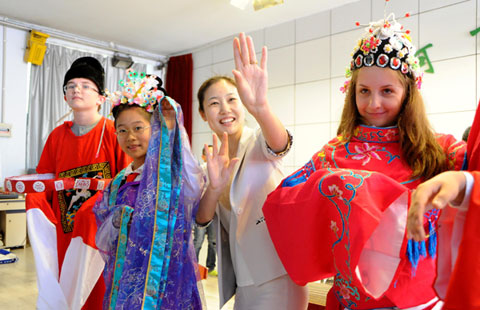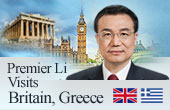
Making East Asia peaceful, prosperous
Comments Print Mail Large Medium Small
Editor's Note: An academic forum on Northeast Asia, "Multicultural Coexistence and Choices for Border Areas", was held at Yanbian University in Yanji, Jilin province, over the weekend. Excerpts from the speeches of some of the participating scholars, put together by China Daily's reporter Cui Shoufeng, follow:
East Asia is one of the most economically advanced regions in the world, but it has not witnessed sufficient economic cooperation between the region's countries. Political hindrance such as a Cold War mentality and the hegemonistic attitude of the US and Japan are primarily to blame for that.
Hence, Beijing's benign relationship with Washington and Tokyo should be seen as a major boost to the region's stability, even though it hinges on further growth in China's comprehensive strength.
Additionally, given the mutual distrust between the major East Asian powers, which is unlikely to change in a short while, more sincere joint efforts are needed from all regional countries to make the wrongs right. Dialogues and negotiations of strategic importance, instead of vague cooperative postures, should be held between governments to that end.
Besides, the proposed Free Trade Agreement, if signed by China, Japan and the Republic of Korea, will help institutionalize economic cooperation in the region. Also, cooperation in environmental protection, which is probably the least controversial issue, can rebuild mutual trust among the regional countries.
Li Wen, deputy director of the National Institute of International Strategy, affiliated to the Chinese Academy of Social Sciences, China
The relationship between China and the Democratic People's Republic of Korea has changed since the latter conducted the third nuclear test in 2013. In fact, Beijing's participation in the UN-led sanctions against Pyongyang after its third nuclear test is being interpreted as a tipping point in bilateral ties.
Moreover, top Chinese leader Xi Jinping's visit to the ROK in July, breaking the established diplomatic practice of visiting the DPRK before the Republic of Korea, reflects Beijing's intention of strengthening China-ROK cooperation.
But China-DPRK ties will continue to develop for the sake of mutual national interest. To cope with the US-led containment policy and maintain the balance of power on the Korean Peninsula, China needs the DPRK as a close ally. And, of course, Pyongyang will require Beijing's assistance to integrate into the international community.
Zhao Lixin, director of the Department of International Political Science, Yanbian University, Jilin province, China
The key to a stable Northeast Asia is permanent peace, which is something that the DPRK craves and supports. The DPRK needs a peaceful environment to become culturally and economically prosperous, which is the prime goal of DPRK leader Kim Jong-un.
Korea was divided not because of internal conflicts but because of the US-led intervention in the 1950s, with the 38th Parallel - an unsolicited agreement between the US and the Soviet Union after World War II - playing an important role. Using force to divide a sovereign state is an old trick of the US to play a dominating role and rake in considerable strategic and economic interests. Hence, to resist such intervention, Pyongyang must safeguard its sovereignty and national interests.
Korea can and should be reunited on the basis of the unity of all Koreans instead of pressure from outside forces. This is not to say that we should not selectively absorb the advanced cultures and technologies of other countries. It is blind copying that should be avoided.
Pak Hyok Chol, dean of the Faculty of Philosophy at Kim Il-sung University, DPRK
There is still hope of international cooperation and regional stability in East Asia despite the region being haunted by escalating tensions. To achieve that, the region's countries have to build mutual trust and should respect each other's sovereignty, political independence and national dignity.
Despite the ideological and institutional differences, all East Asian countries should fulfill their obligations and build mutual trust. This means all the countries in the region have to respect common interests without interfering in each other's internal affairs.
Ri Yong Nam, a researcher at the Postgraduate Research Institution of Social Sciences, affiliated to Kim Il-sung University, DPRK
Whether China seeks global activism or not in its foreign policy depends on the overall stability at home. In other words, China has to solve its own problems before tackling global issues.
Since assuming office in 2012, top Chinese leader Xi Jinping has been making consistent efforts to deepen the reforms in the country, eliminate corruption and curb inflation. This will help China gain a positive image in the eyes of the international community.
Given the increasing historical and territorial problems in East Asia, China is now using a more active diplomacy in the region to show full respect to its neighbors - the Conference on Interaction and Confidence Building Measures in Asia held in Shanghai and Xi's recent visit to South Asia are apt examples of this diplomacy.
China-ROK ties are key to the stability of East Asia, but they are facing a big challenge owing to some global developments - which are different from normal disputes - such as the disagreements over the Free Trade Agreement. Therefore, to ease the tensions in the region and "seek common ground while shelving differences", it is absolutely important that the region's countries hold regular, routine dialogues.
Lee Heeok, professor of the Department of Political Social Science and Diplomacy at Sung Kyun Kwan University, ROK
East Asia has become the world's largest economic zone. But it has been undergoing a structural shift led by advanced economies, particularly the United States, since the end of World War II. Thanks to the division of labor in the manufacturing and service sectors, a new wave of growth is being witnessed by the region's emerging economies. However, new challenges are just round the corner. For one, China's powerful rise has seemingly spawned the problem of commercial trade choices. Since the US-led Trans-Pacific Partnership Agreement would still be used by Washington to exercise control over trade rules in East Asia, the US is unlikely to yield the leadership to China, even though the latter is expected to soon become a bigger economic power.
Besides, this structural shift has prompted a politico-economic change in the region. But how a TPP signatory like Japan can reduce the political and economic risks accompanying the one-sided dependence on the Chinese economy remains uncertain. Given that Japan, Vietnam and the Philippines have territorial disputes with China in the seas, the above issues have to be resolved, paving the way for peace and prosperity in the region.
Hitoshi Hirakawa, professor at Kokushikan University, Japan
Russia is turning toward East Asia, which will benefit its economy and improve the quality of life of Russians in the Far East. The launch of effective trans-border cooperative projects in the Tumen River area is definitely the best available tool for Russia to integrate with its Asian neighbors.
The location of the Tumen River area makes it a solar plexus for Russia's Far East, even for a large part of Northeast Asia. The Trans-Siberian Railway and the Northern Sea Route both start here. Deep-water seaports in Southern Primorye operate all year round and handle two-thirds of exports and almost all imports in East Russia. Moreover, relatively warm seawaters to the south of Vladivostok could boost tourism.
Among all approaches of integration, cooperation in natural resources extraction (especially oil and gas), transport and logistics, and eco-tourism can be achieved at relatively low costs. Of course, such a project requires time, funds and skilled workforce to become a success.
Sergey M. Smirnov, director of the Center for Maritime International Studies, Admiral Nevelskoy Maritime State University, Russia
The opinions expressed on this page do not necessarily reflect those of China Daily.
(China Daily 10/16/2014 page9)
Background






